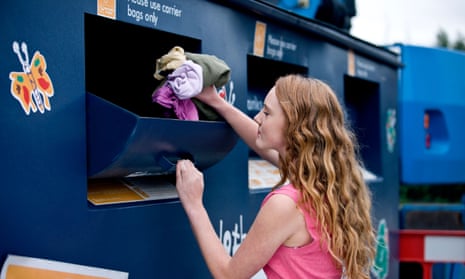Fashion shoppers spent about £3.5bn on Christmas party clothing this year – but 8 million of those sparkly items will be on their way to landfill after just one wear.
So-called fast fashion has ushered throwaway culture into the clothing business, with items so cheap they have become single-use purchases.
Last week, the young-fashion brand Boohoo had 486 dresses available online for less than £5. Many – like a black bandeau jersey bodycon number – were just £3.75, meaning the delivery charge cost more than the contents of the package. Rival Asos was offering 257 dresses and 2,141 different tops for less than £10.
Now, however, some fashion experts believe the party could be coming to an end for such disposable clothing and a backlash could be brewing, just as it has against takeaway coffee cups, plastic packaging and meat. Overall, the fashion industry as a whole is contributing more to climate change than the aeronautical and shipping industries combined. If trends continue, the industry could account for a quarter of the world’s carbon budget by 2050.
In the past 15 years, global clothing production has doubled to meet demand. But it has left a trail of cast-offs, with more than half of fast fashion items thrown away in less than a year, according to the consultants McKinsey.
Disposing of clothing and household textiles costs the UK alone about £82m a year, according to a 2014 study by the government-backed recycling charity Wrap.

In 2015, greenhouse gas emissions from textiles production globally totalled 1.2 billion tonnes of CO2 equivalent, according to a report by the industry-led Circular Fibres Initiative. This is more than the emissions of all international flights and maritime shipping combined.
Less than 1% of the material used to produce clothing globally is recycled into new clothing, with 12% recycled into other products such as insulation or mattress stuffing.
With a parliamentary committee set to produce a report on the issue in February and concerns about plastic pollution spurred by the BBC’s Blue Planet documentary now turning to microfibres from clothing, industry insiders believe a backlash against fast fashion is on the way.
Mike Barry, director of sustainable business at Marks & Spencer, said: “The signals are [fashion is] on the same trajectory as plastics and forests and alternatives to meat. These were all underlying concerns that got through to the mainstream consumer.
“There is not an obvious consumer backlash against fast fashion today, but it would be a very brave business leader who didn’t look into the next 12 to 18 months and say we are not heading there. Every business leader in the fashion industry knows that clothing will have the same level of questioning and challenging that food has had for years.
“It is going from being a business-to-business and risk-management issue behind the scenes to a consumer issue, in the same way as plastics and deforestation linked to palm oil have been in the last 12 months.”
His hunch is backed up by research that suggests shoppers have already begun buying clothing less frequently.
In 2018, a third of consumers bought clothing once a month, down from 37% in 2016, while those buying every two or three months or less rose from 64% to 67%, according to the market research firm Mintel.
Samantha Dover, senior retail analyst at Mintel, says nearly half of consumers say they prefer to buy clothing from companies trying to reduce their impact on the environment, and that rises to 60% among under-24s.
“People are far more interested than before in knowing exactly where products are coming from and how they are being made,” Dover says. She says consumers are still more interested in the price and style of the clothing than where and how it has been made, but that change is coming.
With that in mind, switched-on clothing companies are no longer just setting up a few racks of eco clothing in the corner of a store but considering how to make their entire range more sustainable.
The government-backed sustainable clothing action plan, whose signatories include Next, M&S, Ted Baker, Primark and Asos, has committed nine major retailers to reducing waste being sent to landfill, water use and carbon footprint by 15% by 2020.
The government also wants to introduce extended producer-responsibility schemes for household and commercial textiles and clothing, similar to those currently in place for batteries and electronics, which would force companies to pay for the recovery of waste. But it is a slow process, with consultation promised only by 2025.
Mary Creagh MP, chair of the parliamentary environmental audit committee, which has been investigating fashion industry sustainability, says the timetable is too slow.
“We have only got 12 years to tackle damaging climate change,” she says. “We as consumers have to ask questions of brands. Brands have to make it part of what they do. These are massive companies run by some of the world’s richest men. Someone is doing OK out of it.”
Creagh adds that cheap fashion comes with a social as well as an environmental cost – with low-paid workers overseas unable to provide for their families. “We are not saying to people on a low income you can’t buy cheap clothes. We are saying it is time that the cost should reflect the true cost of the minimum wage and decent working conditions and growing stuff without pesticides. It needs to be sustainable from top to bottom and we don’t think the true cost is a £5 dress. That price is not being paid by us, it is being paid by someone else and the environment.”

Testifying to Creagh in parliament, Boohoo said that its £5 dresses were intended as loss leaders on which the company made no profit. It has also previously said that it takes sustainability seriously: ‘The youthful demographic of our customer means that education is key and we use our huge reach across social channels globally to help share ideas of how a garment can be utilised in their wardrobe again and again. We are also working with reGAIN, a company that allows users to recycle unwanted clothing to prevent them from going to landfill.”
Environmental campaigners say people who want to be more sustainable should choose quality clothes and make them last as long as possible by learning to repair or rework them. Buying secondhand or vintage clothing, considering renting outfits rather than buying, and washing garments less often at lower temperatures in a full machine can all help.
In many ways, younger people are ahead of the game, using trading sites such as Depop and Thredup to resell and upcycle clothing.
Even cleaning and mending services appear to be in vogue. Earlier this month, H&M brought its free mending service to the UK, making it a key part of a store revamp in Hammersmith. The brand is jumping on a bandwagon kickstarted by ethical brands such as Patagonia, which makes 40,000 repairs a year at its service centre in Reno, Nevada.
Meanwhile, the Los Angeles-based sports shoe cleaning specialist Jason Markk opened its first London store in March on Carnaby Street. It claims its “sneaker care technicians” have professionally cleaned more than 50,000 pairs of shoes since opening in the US in 2014.
Recycling is also becoming mainstream, with Primark set to launch a clothing take-back scheme in 2019, joining similar efforts by M&S and H&M that have been in operation for several years. Barry at M&S, which collects about 3 million items a year via its “shwopping” scheme, says it is only part of the answer. “The challenge is not getting clothing back: it’s what to do with it,” he says.
About 1.2 million tonnes of fibre from clothing is sold in the UK every year, about half of which is cotton, a third synthetic and the rest viscose or animal products such as leather. Reprocessing these fibres is tricky, according to Mark Sumner, a lecturer in sustainable fashion at the University of Leeds.
Most fabrics are a mix of different kinds of thread – such as cotton and Tencel for a T-shirt – and there are currently no commercial-scale facilities that can separate and reprocess such fabrics. Strong modern dyes are also extremely difficult to remove so, meaning that recycled threads cannot be recoloured.
Sumner says: “The more you process and play with them the worse they are and the quality reduces. “Recycled fibres through traditional routes are poor quality.”
Sumner and Barry say the government and businesses need to fund research into how good-quality fibres can be reprocessed on a large scale to build a closed-loop industry. “If we can find a way of recycling, we can think about the UK being an exporter of those fabrics or rescuing our textile industry. There is an economic story there,” Sumner says.











Comments (…)
Sign in or create your Guardian account to join the discussion